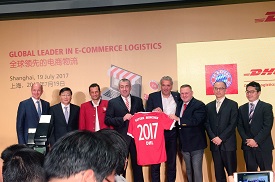Deutsche Post DHL had little to say today about reported plans to seek a local partner to deliver e-commerce imports to China’s hundreds of millions of middle-class consumers.
The South China Morning Post reported yesterday that Deutsche Post DHL is searching for a partner to expand its package delivery scale in mainland China to help cope with the surging volume of European goods shipped into China as part of the fulfilment of online shopping.
Zheng Zhi, managing director of DHL’s e-commerce operations in greater China, told the Hong Kong-based newspaper: “We are studying the possibility of forming a tie with a local partner… We believe it is conducive to work with strong local delivery companies to explore the potential arising from the cross-border e-commerce.”
However, in response to CEP-Research questions about a possible partnership, a DHL Asia Pacific spokesman said only: “DHL eCommerce uses local courier companies to deliver inbound B2C shipments and develops local partnerships as necessary depending on the requirements of our customers.”
Apart from China Post, the leading Chinese delivery companies are SF Express, which recently signed a joint venture with UPS, YTO Express, which cooperates closely with Alibaba, STO Express, Yunda Express and ZTO Express.
The newspaper report came after a DHL press conference in Shanghai last week to coincide with a China tour by Bayern Munich. As the German football club’s official logistics and e-commerce partner, DHL launched FC Bayern Munich's online store on Tmall Global in 2015 and continues to deliver official merchandise to fans in China.
Deutsche Post DHL Group used the event to highlight its expanding China logistics operations and capabilities. With US$469 billion market size, China is by far the world's biggest and fastest growing e-commerce market. The country's cross border e-commerce is estimated to be worth US$839 billion by 2021 and expected to grow at 20.1% from 2015 to 2020, with huge opportunities both in the segment of low value items and high value items.
Juergen Gerdes, Board Member Post – eCommerce – Parcel, told journalists: "Our strategic aspiration is to become the leader in e-commerce-related logistics, with the Asia-Pacific region and especially China playing a crucial role in our strategy. Offering our customers worldwide flexible, innovative and eco-friendly delivery solutions is necessary to consolidate this development. By means of the innovations and green logistics solutions we brought to market, we are set to help Asian retailers grow and exploit the opportunities e-commerce offers."
DHL eCommerce, Deutsche Post DHL’s parcel delivery division outside Europe, mostly focuses on offering cross-border deliveries of e-commerce shipments. However, it is also gradually expanding into domestic deliveries in selected markets, most recently in Vietnam.
In the Chinese market, it offers two main outbound cross-border products tailored for e-commerce: DHL GM Packet, an affordable option to ship small, lightweight e-commerce orders for worldwide deliveries; and DHL Parcel International Direct for parcels up to 20kg from China to key e-commerce export lanes such as Australia, US, UK, and Israel. This latter service is expected to be expanded into Malaysia and Thailand, as demand for Chinese products from Southeast Asia continues to grow.
In addition, DHL eCommerce also offers a global fulfillment network for Chinese e-commerce sellers, allowing merchants to position their inventory closer to their customers, improving their delivery time while reducing shipping costs. These facilities are engineered as shared-use fulfillment centers, allowing customers to share space and assets within the warehouse.
DHL-Sinotrans, the group's market-leading international express joint-venture, claims to offer the largest international express services network in China covering 80% of China's major population and business centres. To cater to business-to-consumer (B2C) deliveries, the company rolled out On Demand Delivery to allow deliveries to be made at pre-arranged times and locations. In the e-commerce sector, the international express service is primarily used by customers for the delivery of high end, higher value goods where speed and guaranteed transit times are of paramount consideration.
DHL Supply Chain operates over 540,000 sqm of warehousing space in China and offers a range of value added services. The growth of e-commerce necessitates investments in different types of facilities to cater to the omni-channel consumers' expectations. Traditional warehouses typically carry bulk items with few stock keeping units (SKUs), but e-commerce fulfillment centers tend to store a much wider variety of SKUs in smaller quantities such as fresh food items and consumer products, requiring a shift in operation modes and organization, according to the group.
With many customers providing e-commerce services, or engaging with e-commerce merchants, DHL Supply Chain has been growing its B2C capabilities and developing more e-commerce fulfillment centers in China. With growing demand from customers, DHL Supply Chain plans to further invest to enhance its e-commerce capabilities in tier 1 cities, and grow fulfillment and last mile delivery capabilities in tier two cities and beyond.
Finally, DHL Global Forwarding’s international air, sea and multimodal rail transport services are increasingly utilized by the e-commerce industry. With the rising middle class in China, the freight forwarding business has been seeing significant volume growth from the booming e-commerce sector, particularly in fashion apparel, accessories, baby products and cosmetics for import, and computer, communication, and consumer electronics products for export.










